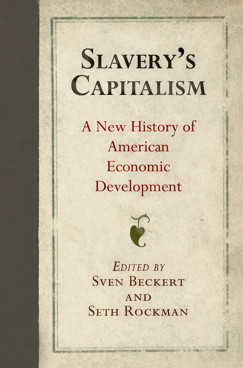Closing our week-long forum on Slavery’s Capitalism, today’s post is courtesy of Kevin Waite, a Lecturer in Modern American History at Durham University in the United Kingdom. He was recently awarded his PhD at the University of Pennsylvania with a thesis entitled “The Slave South in the Far West: California, the Pacific and Proslavery Visions of Empire.”
 No one could possibly read the fourteen essays that comprise Slavery’s Capitalism and conclude that human bondage was not absolutely central to American, and indeed global, economic development during the nineteenth century. [1] But it’s one of the corollary aims of the book—to move beyond the regionalism that has characterized much of the scholarship on slavery—that seems to me a more provocative, more novel, and perhaps more fraught intervention.
No one could possibly read the fourteen essays that comprise Slavery’s Capitalism and conclude that human bondage was not absolutely central to American, and indeed global, economic development during the nineteenth century. [1] But it’s one of the corollary aims of the book—to move beyond the regionalism that has characterized much of the scholarship on slavery—that seems to me a more provocative, more novel, and perhaps more fraught intervention.
The long tentacles of slavery stretched across the globe and reached into a staggering array of institutions – educational, legal, financial, and political.This becomes especially clear by the final section of the book, “National Institutions and Natural Boundaries.” Compelling essays by Craig Steven Wilder, Andrew Shankman, Alfred L. Brophy and John Majewski provide a fitting capstone to a geographically and conceptually wide-ranging book. This is a history of slavery that catapults us far beyond the slave South. Continue reading